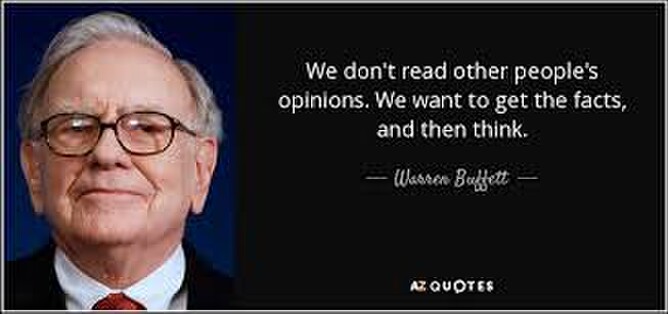Unless it is supported by facts.
“No one is interested in your opinion - unless it is supported by facts.”
This is the quote that sticks in my brain from my first year of Law Study. Our society is driven by the law, and legislation and judge made law create the framework that our world works in. The legal system and rules and regulations have been in existence for many years – so is a good place to look to learn how to analyse information and create new frameworks for thinking.
As a financial adviser my recommendations to clients are based on analysis. Analysis of the investment and economic environment, of investment and insurance solutions for my clients. Analysis of my clients’ current situation, their dreams and goals and how they can go about achieving them. I have been a financial adviser since 1997 and over those 19 years have learned a lot about researching and analysing, but that quote from first year law provides me with a Golden Rule.
Traditionally our news and information came to us from journalists with a very strong fact checking ethos and ethics and rules around bias and partisanship. This was supplemented by academic papers and research and legal discourse with similar ‘rules.’
In todays online world there are many opinions. The ‘rules’ don’t seem to apply. Sadly, even journalists don’t seem to be ‘fact checking’ or fulfilling the bias requirements of their profession. With the ‘free speech’ permitted by instant publication rigorous analysis of bias and whether ‘research’ publications have any factual basis appears to have disappeared.
As both a student of law and a financial planner, I encounter this lack of credibility in published items regularly. Unfortunately, in addition to the blogosphere, twitter and media reports, this lack of robustness appears to have flowed through to ‘research papers’ presented and published as being ‘expert’.
Melville Jessup Weaver report
The publication on November 23rd 2015 of an ‘expert’ research report entitled ‘Review of Retail Life Insurance Advice’ by Melville Jessup Weaver (MJW) prompted me to write this article. This report was commissioned by the Financial Services Council of New Zealand. This is an organisation that: “represents investment and life insurance companies in New Zealand and has 21 investment and life insurance members and 18 associate members.’
The report led to most of the life insurers resigning their membership of the organization (as a result of the report not being on brief and the lack of fact based findings.) However, a number of ‘leading’ journalists taking quotes from the report as ‘gospel’ and publishing them. These journalists appeared to disregard the blatant bias and partisanship in the report and the lack of fact supporting the statements and ‘findings’ of the report.
As an example: The MJW report produced a diagram and statement that insurance policies written by financial advisers had a high ‘lapse rate’ after three years, whilst insurance policies written by banks and direct channels did not. This claim formed the core of the report, and led to statements like: ‘40% to 50% of all new business written by advisers was replacement business, whereas for banks it was far lower at 10%”
These quotes were published verbatim in some of the New Zealand media, without any fact checking. A simple reading of the MJW report enables a reader to discover that this information has no fact basis at all and was ‘made up’ by the authors. There is no fact basis, no data to refer to that showed the quantum or whether this graph was based on ‘anecdotes’ as had been outlined earlier in the report. There is no robustness in this information, but the media still published this ‘opinion’ as ‘expert information.’
Fortunately, the experts in the industry did read the report and recognized that this partisan, biased report was purely opinion and did not have any fact basis. However, the media representations are the ones that the public are left with.
So, what does this mean in todays world?
In my role as a trusted financial adviser to my clients, it is vital that I check the credibility and veracity of any information on which I am relying. Daily I am presented with ‘fact’ and ‘expert’ information. This is the process that I use to decide whether to read or listen any further and to ascertain how much weighting I will give to the information:
- Who is the author? What credentials do they have? What is their history? What bias or partisan relationships do they have that are likely to affect what they are saying. Even if there is a bias, the information can still be worth digesting, but allowing for that bias.
- When was it written? It is important to put the information in context of what was happening at that time.
- What audience was the information written for? Again, this gives valuable context.
- What are the facts supporting this opinion? Are they well referenced so that I can check their veracity? What is the quality of the sources of those facts – are they credible?
- Has the information been peer reviewed?
- Is the information free? If yes, why? Is there a motive that doesn’t help my clients in publishing this information?
These are valuable tools and vital to ensuring that the information that we are relying on is robust and ‘expert’.
I recommend that you ensure that you view any ‘expert’ report with these filters as well to ensure that you are getting an accurate ‘expert’ opinion.
http://www.epmu.org.nz/journalist-code-of-ethics/ (accessed 29/01/2016)
Respect for truth and the public's right to information are overriding principles for all journalists. In pursuance of these principles, journalists commit themselves to ethical and professional standards. All members of the Union engaged in gathering, transmitting, disseminating and commenting on news and information shall observe the following Code of Ethics in their professional activities:
(a) They shall report and interpret the news with scrupulous honesty by striving to disclose all essential facts and by not suppressing relevant, available facts or distorting by wrong or improper emphasis.
(b) They shall not place unnecessary emphasis on gender, race, sexual preference, religious belief, marital status or physical or mental disability.
(c) In all circumstances they shall respect all confidences received in the course of their occupation.
(d) They shall not allow personal interests to influence them in their professional duties.
(e) They shall not allow their professional duties to be influenced by any consideration, gift or advantage offered and, where appropriate, shall disclose any such offer.
(f) They shall not allow advertising or commercial considerations to influence them in their professional duties.
(g) They shall use fair and honest means to obtain news, pictures, films, tapes and documents.
(h) They shall identify themselves and their employers before obtaining any interview for publication or broadcast.
(i) They shall respect private grief and personal privacy and shall have the right to resist compulsion to intrude on them.
http://fsc.org.nz/ (accessed 29/01/2016)
“We asked for information on the insurer’s lapse rates by product and over the last 4 years. The insurers do not analyse lapses in a uniform manner and some could not provide analysis for the last 4 years. For those that did, there was no discernable trend for the period. The lapse rates were viewed as the most commercially sensitive information we collected. As a result we have decided to present a graph showing the relative shapes of lapses for the three sales channels.” Melville Jessup Weaver, ‘Review of Retail Life Insurance Advice’, November 2015 page 37.
If you have any thoughts or opinions that you would like to share, visit us at our Twitter, Facebook or Linked In pages, and comment.
For more blog entries that you might be interested in:
Warren Buffet Investment Quotes
Investment Turbulence – why good financial planning is important
11 attributes of successful investment managers
By Carey Church






